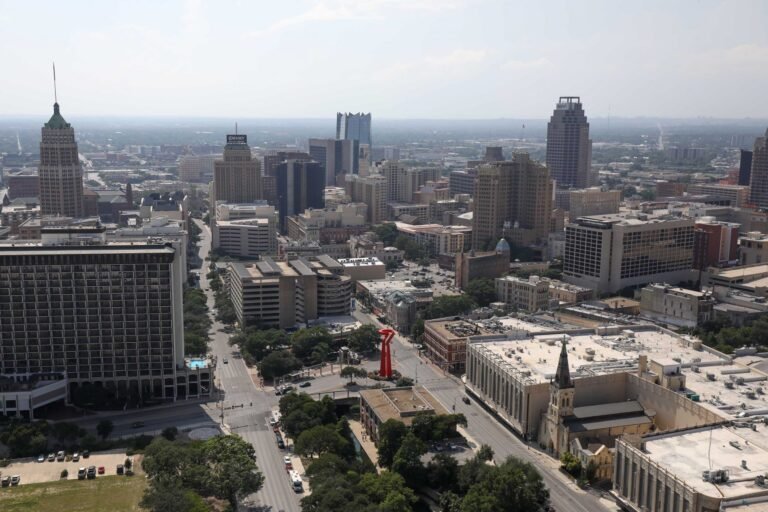DALLAS– As Texas’ significant city locations come to grips with an excess of uninhabited workplaces, state legislators might make it simpler to change vacant workplace and business area right into residences.
A costs by state Sen. Bryan Hughes, a Mineola Republican politician, would efficiently enable proprietors of battling workplace residential properties in the state’s biggest cities to transform that area right into homes. The expense would certainly restrict cities and regions from needing proprietors of flagging office complex and business residential properties like mall and strip facilities to undergo a rezoning procedure if they wish to include apartment or condos or condos.
The concept is amongst a slate of propositions state legislators are evaluating to eliminate obstacles to real estate building and construction and increase real estate alternatives to place a damage in Texas’ deep real estate lack– a vital motorist of the state’s high home rates and leas.
” It’s a basic issue of taking a look at the real estate supply that’s offered and taking a look at the expanding need, and taking a look at every choice to increase those chances,” Hughes stated in a meeting. “The Lord’s not making colony.”
Few locations in Texas have actually gone unblemished by the state’s climbing real estate expenses. Majority of the state’s tenants are “cost-burdened,” suggesting they invest greater than 30% of their revenue on maintaining a roof covering over their heads, according to a current evaluation by the Joint Facility for Real Estate Researches at Harvard College. Home rates have actually significantly outmatched revenues.
Hughes’ expense becomes part of a collection of propositions state legislators are taking into consideration to enable even more homes to be developed. Most of those propositions take purpose at cities’ zoning laws, which limit what type of homes can be developed and where. An expanding body of research study reveals that loosening up those regulations can assist cities include even more homes and include real estate expenses.
Some regional authorities are anxious concerning the possibility of state legislators bypassing city zoning laws in a covering way. In the Austin residential area of Georgetown, authorities are evaluating adjustments to the city’s growth code to enable accessory home devices and lower lot-size demands, Mayor Josh Schroeder stated. Those type of choices, he stated, must continue to be at the regional degree.
” To do it on this macro degree that does not consider the distinctions in between Georgetown, Austin and Littlefield is not the means to manage land usage,” Schroeder stated.
The surge of remote job amidst the COVID-19 pandemic increased workplace openings in Texas’ significant urbane areas. Staff members in Texas’ biggest cities have actually gone back to the workplace at greater prices than their peers in various other significant united state cities, according to information from Kastle Equipments, a protection company that tracks workplace tenancy. Still, job prices for workplace in the state’s significant city locations continue to be over pre-pandemic degrees.
As workplaces cleared and real estate expenses blew up, real estate supporters, workplace property owners and policymakers significantly considered office-to-residential conversions to take on numerous troubles. Including homes would certainly assist try the country’s real estate lack, they have actually stated. Overhauling delayed workplaces right into homes would certainly likewise maintain those residential properties economically feasible, fending off affliction and remaining to produce real estate tax income for city governments and college areas.
Nevertheless, it is not a silver bullet. These conversions compose a tiny portion of the nation’s homebuilding. Office-to-residential conversions have actually led to virtually 28,000 brand-new real estate devices across the country because 2016, according to numbers from CBRE Team, an industrial realty solutions and investment company. Of those, concerning 2,400 remain in Texas. One more 2,800 devices are underway or in the operate in Texas, out of concerning 38,000 throughout the nation.
Transforming workplaces to homes can commonly be complicated, designers and realty specialists have actually stated. For one, not every office complex makes good sense to exchange real estate because of elements like unwieldy layout and pipes requires.
Zoning laws can likewise obstruct of office-to-residential conversions– an obstacle Hughes is attempting to deal with.
Texas’ biggest cities have a tendency to instantly enable office complex in their midtowns, where workplace openings are maybe most noticeable, to come to be apartment or condos, according to a Texas Tribune evaluation of city zoning codes. Hughes’ proposition would certainly open that very same advantage for proprietors of office complex beyond midtown areas.
If it ends up being regulation, proprietors of various other type of structures– consisting of business structures, shopping mall and storehouses– that wish to renovate their area right into apartment or condos or condos, would certainly likewise no more need to go with the rezoning procedure.
That procedure can be expensive and prolonged, real estate supporters and designers claim– leading to greater expenses for the ultimate renter, if home builders aren’t hindered from progressing with tasks to begin with.
” When there’s even more expenses included, ultimately that’s mosting likely to need to obtain worked off to the citizen,” stated Jamee Happy, that heads The Property Council, a Dallas-based realty profession team.
The regulations would just use in regions with greater than 420,000 citizens– 13 of the state’s 254 regions– and communities within those regions that have greater than 60,000 citizens.
Graphics by Carla Astudillo, The Texas Tribune
This short article initially showed up in The Texas Tribune, a member-supported, detached newsroom notifying and involving Texans on state national politics and plan.



